广东省深圳市 2016中考英语 课本梳理 Unit 7-8 复习课件
文档属性
| 名称 | 广东省深圳市 2016中考英语 课本梳理 Unit 7-8 复习课件 | 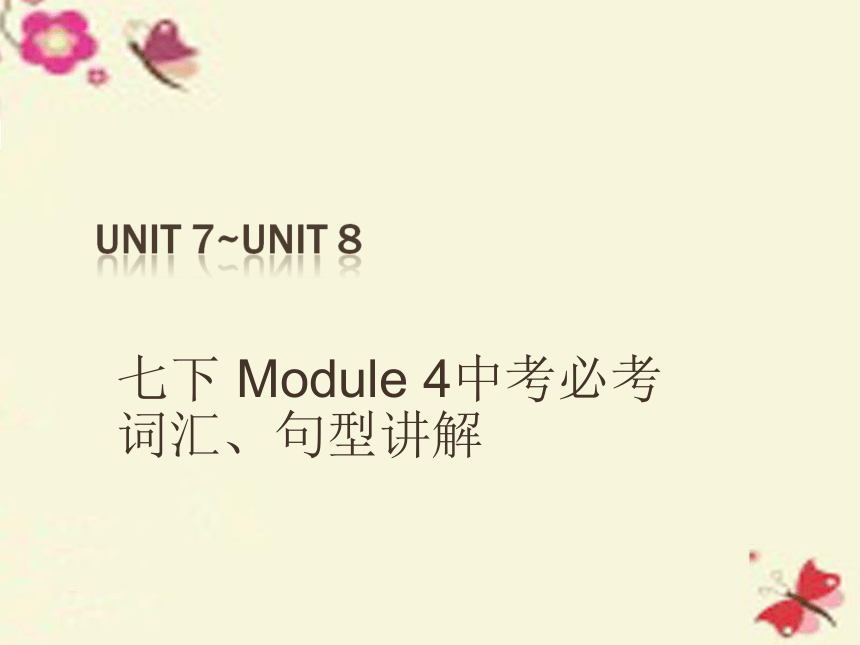 | |
| 格式 | zip | ||
| 文件大小 | 173.2KB | ||
| 资源类型 | 教案 | ||
| 版本资源 | 牛津深圳版 | ||
| 科目 | 英语 | ||
| 更新时间 | 2016-07-19 00:00:00 | ||
图片预览

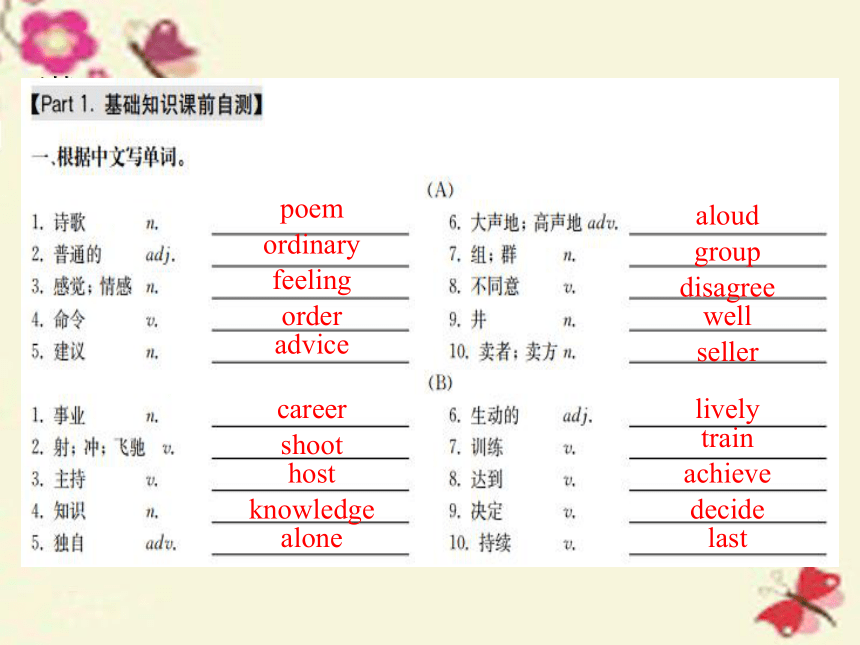
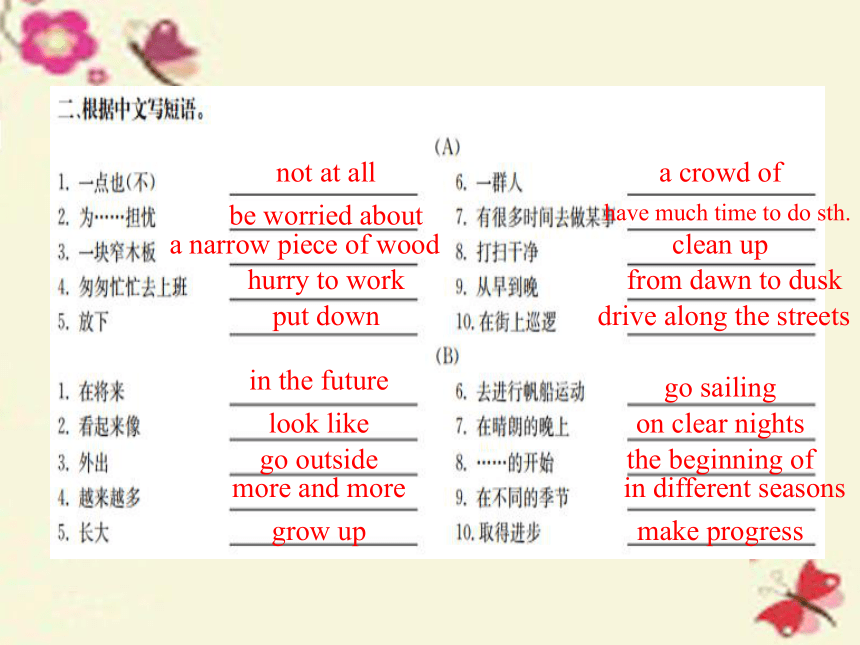
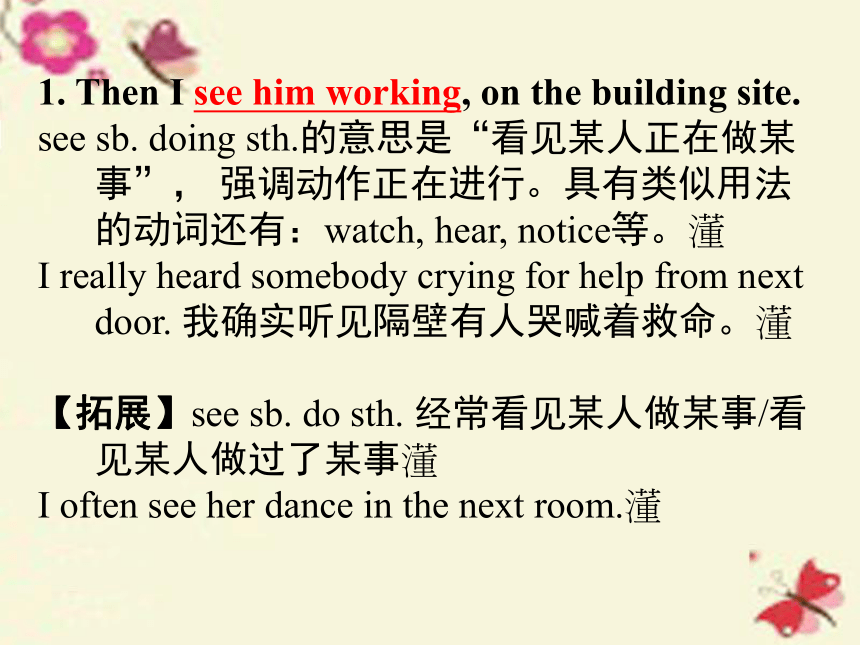
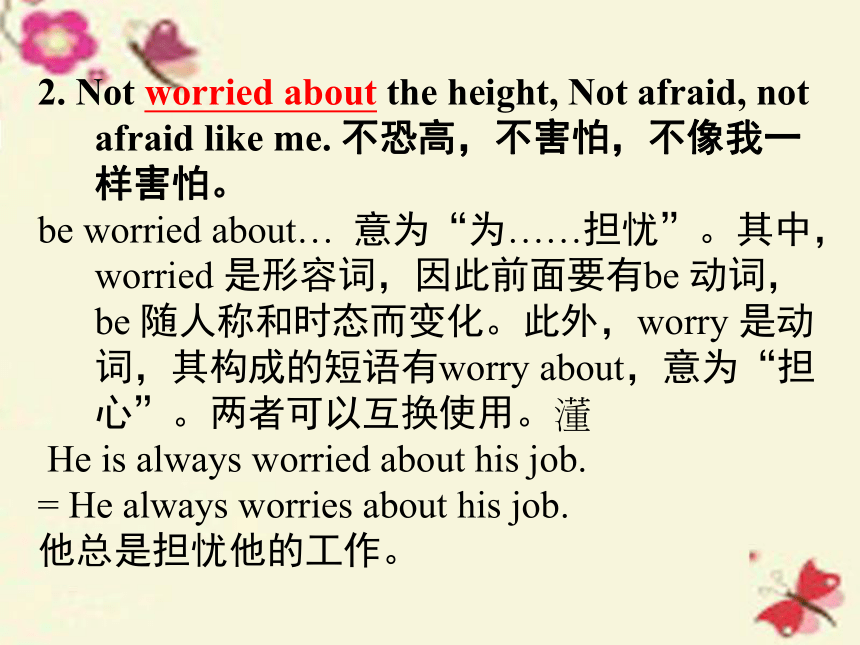
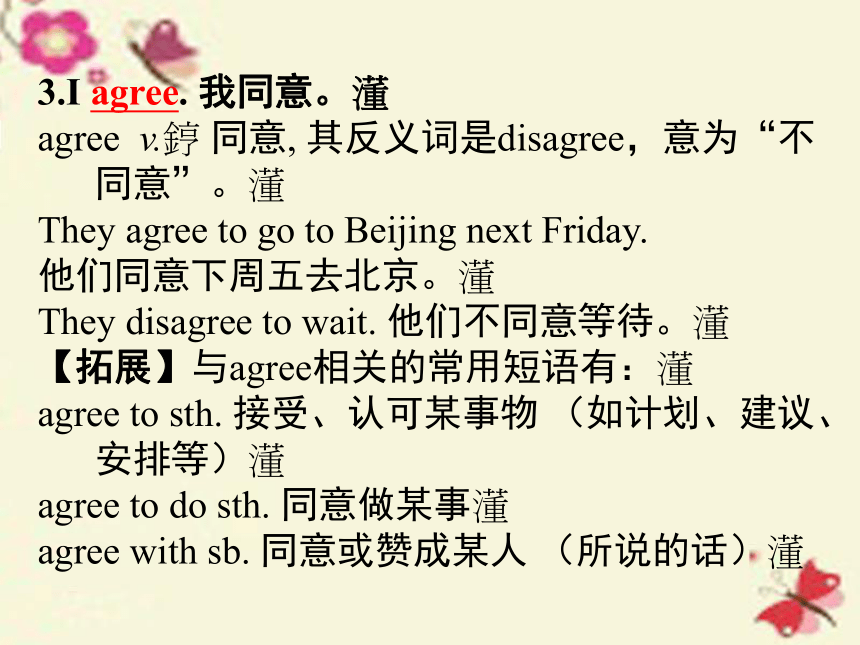
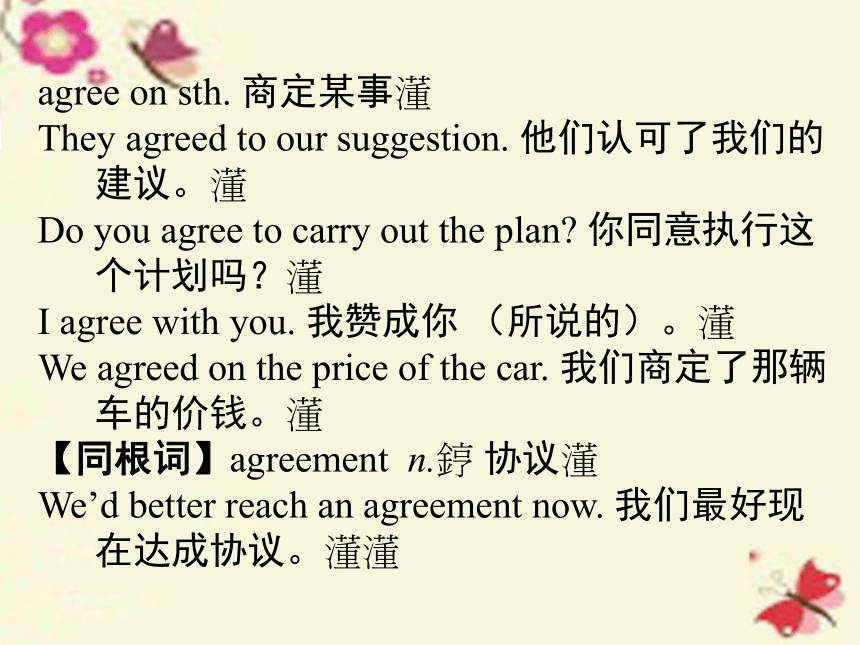
文档简介
课件19张PPT。七下 Module 4中考必考词汇、句型讲解?poemordinaryfeelingorderadvicealoudgroupdisagreewellsellercareershoothostknowledgealonelivelytrainachievedecidelastnot at allbe worried abouta narrow piece of woodhurry to workput downa crowd ofhave much time to do sth.clean upfrom dawn to duskdrive along the streetsin the futurelook likego outsidemore and moregrow upgo sailingon clear nightsthe beginning ofin different seasonsmake progress1. Then I see him working, on the building site.
see sb. doing sth.的意思是“看见某人正在做某事”, 强调动作正在进行。具有类似用法的动词还有:watch, hear, notice等。?
I really heard somebody crying for help from next door. 我确实听见隔壁有人哭喊着救命。?
【拓展】see sb. do sth. 经常看见某人做某事/看见某人做过了某事?
I often see her dance in the next room.?2. Not worried about the height, Not afraid, not afraid like me. 不恐高,不害怕,不像我一样害怕。
be worried about… 意为“为……担忧”。其中,worried 是形容词,因此前面要有be 动词,be 随人称和时态而变化。此外,worry 是动词,其构成的短语有worry about,意为“担心”。两者可以互换使用。?
He is always worried about his job.
= He always worries about his job.
他总是担忧他的工作。 3.I agree. 我同意。?
agree v.? 同意, 其反义词是disagree,意为“不同意”。?
They agree to go to Beijing next Friday.
他们同意下周五去北京。?
They disagree to wait. 他们不同意等待。?
【拓展】与agree相关的常用短语有:?
agree to sth. 接受、认可某事物 (如计划、建议、安排等)?
agree to do sth. 同意做某事?
agree with sb. 同意或赞成某人 (所说的话)?agree on sth. 商定某事?
They agreed to our suggestion. 他们认可了我们的建议。?
Do you agree to carry out the plan? 你同意执行这个计划吗??
I agree with you. 我赞成你 (所说的)。?
We agreed on the price of the car. 我们商定了那辆车的价钱。?
【同根词】agreement n.? 协议?
We’d better reach an agreement now. 我们最好现在达成协议。??4. I sweep the streets, and make them clean, and help keep our city green.?
(1) make sb./sth.+ adj.? 意为“让某人或某物变得……”?
【拓展】make sb. do sth.,意思是“使某人做某 事;让某人做某事”。?
My best friend always makes me happy.
我最好的朋友总是让我很开心。?
She often tells jokes to make me laugh.
她经常讲笑话逗我笑。??
(2) keep sb./sth. + adj.?意为“让某人/某物保持……状态”。?
We should keep our eyes closed when doing eye exercises. 我们做眼保健操时必须闭着眼睛。
【拓展】keep doing sth. 一直做某事?
They kept working in the field though it was dark. 虽然天黑了,但他们一直在田里工作。? 5. I used to go outside with my mum on clear nights and look at the sky.?
(1) used to意为“曾经”,可用于各种人称,后接动词原形,用来谈论过去常常做某事,暗含现在不再做此事了。used to的否定形式为didn’t use to,意为“过去不常……”。used to的一般疑问句结构为:Did+主语+use to do sth.。?
Steven used to work on a farm but now he works in a bank.?
史蒂芬过去在一家农场工作,但是现在他在一家银行工作。?Lily didn’t use to like potatoes when she was young. 莉莉小时候不喜欢土豆。?
—Did you use to watch TV on Saturdays?
你过去常在星期六看电视吗??
—Yes, I did. 是的,我常在周六看电视。—No, I didn’t.
不,我不常在周六看电视。?
另外,used to在与never等副词连用时,常位于这些副词之后。?
She never used to go there. 她以前从没去过那儿。?【拓展】use sth. to do sth. 用……做……?
be used to do sth. = be used for doing sth.被用来做……?
be used to doing sth. 习惯做某事?
They use wood to make paper. 他们用木头做纸。?
Wood is used to make paper. = Wood is used for making paper. 木头被用来做纸。?
He is used to living in the countryside. 他习惯了乡村的生活。??
(2) night常与介词at搭配,构成at night,意为“在夜晚”。但当night前有形容词或其他名词时,则须用介词on,且night前要加上冠词a/an或使用其复数形式。?
On a rainy night, she left and never came back.在一个雨夜,她离开了,再也没有回来。??6. Studying the stars was great fun for me.?
(1) 动词作主语时,常用其ing形式或不定式形式,此时谓语动词用单数。?
Talking with him makes me feel comfortable.与他交谈让我觉得很舒服。?
To see is to believe. 眼见为实。?
(2) fun作名词,意为“有趣的事”,常与great, much等连用。?
Sailing is great fun. 划船是一大乐趣。?
7. It has lasted for more than 50 years!?
last作动词时,意思是“持续”,不用于进行时。后常接for+一段时间,也可直接加一段时间。?
Each game lasts about an hour. 每场比赛持续约一小时。?
last还可作形容词,意思是“最后的;上一个的”。
We caught the last bus home. 我们赶上了回家的末班车。?
【常用短语】at last=in the end=finally?
At last, we finished the job on time.
最后,我们按时完成了工作。??
8. One day, I decided to leave my job.?
decide v.?决定
decision n.?决定 ?
decide to do sth.意为“决定去做某事”
=make up one’s mind to do sth.
=make a decision to do sth.
decide on sth.意为“决定某事(物)”。?
I decide to visit my grandma this weekend.
我决定这周末去看我奶奶。?
It’s hard to decide who to invite. 很难决定邀请谁。?9. I trained to be a sailing teacher.?
train用作动词,意思是“训练,接受训练”。当它用作不及物动词时,train as/to be是其常用短语,意思是“接受做……的训练”。?
Our football team is training for the next game. 我们的足球队正在为下一次比赛而进行训练。
She trained as/to be a nurse. 她受过护士训练。?
train也用作及物动词。train sb. to do sth.是其常用结构,意思是“训练某人做某事”。?
They are training soldiers. 他们正在练兵。
He has spent a year training himself for next month’s match. 为了参加下个月的比赛,他花了一年的时间训练自己。?
【拓展】train也用作名词,意为“火车”。trainer表示“训练员;教练员”。?
We get off the train at the next station.
我们在下一站下火车。?
He is an animal trainer for the circus.
他是马戏团的驯兽师。?10. How did the woman feel about her first job?
How do you feel about...? 意为“你认为/觉得……怎么样?” 用来询问对方对某事的看法。可用“What do you think of…?” 以及 “How do you like…?”替换。?
—How do you feel about/like the film?
= What do you think of the film?
你认为这部电影怎么样?
—I don’t like it. 我不喜欢它。?
see sb. doing sth.的意思是“看见某人正在做某事”, 强调动作正在进行。具有类似用法的动词还有:watch, hear, notice等。?
I really heard somebody crying for help from next door. 我确实听见隔壁有人哭喊着救命。?
【拓展】see sb. do sth. 经常看见某人做某事/看见某人做过了某事?
I often see her dance in the next room.?2. Not worried about the height, Not afraid, not afraid like me. 不恐高,不害怕,不像我一样害怕。
be worried about… 意为“为……担忧”。其中,worried 是形容词,因此前面要有be 动词,be 随人称和时态而变化。此外,worry 是动词,其构成的短语有worry about,意为“担心”。两者可以互换使用。?
He is always worried about his job.
= He always worries about his job.
他总是担忧他的工作。 3.I agree. 我同意。?
agree v.? 同意, 其反义词是disagree,意为“不同意”。?
They agree to go to Beijing next Friday.
他们同意下周五去北京。?
They disagree to wait. 他们不同意等待。?
【拓展】与agree相关的常用短语有:?
agree to sth. 接受、认可某事物 (如计划、建议、安排等)?
agree to do sth. 同意做某事?
agree with sb. 同意或赞成某人 (所说的话)?agree on sth. 商定某事?
They agreed to our suggestion. 他们认可了我们的建议。?
Do you agree to carry out the plan? 你同意执行这个计划吗??
I agree with you. 我赞成你 (所说的)。?
We agreed on the price of the car. 我们商定了那辆车的价钱。?
【同根词】agreement n.? 协议?
We’d better reach an agreement now. 我们最好现在达成协议。??4. I sweep the streets, and make them clean, and help keep our city green.?
(1) make sb./sth.+ adj.? 意为“让某人或某物变得……”?
【拓展】make sb. do sth.,意思是“使某人做某 事;让某人做某事”。?
My best friend always makes me happy.
我最好的朋友总是让我很开心。?
She often tells jokes to make me laugh.
她经常讲笑话逗我笑。??
(2) keep sb./sth. + adj.?意为“让某人/某物保持……状态”。?
We should keep our eyes closed when doing eye exercises. 我们做眼保健操时必须闭着眼睛。
【拓展】keep doing sth. 一直做某事?
They kept working in the field though it was dark. 虽然天黑了,但他们一直在田里工作。? 5. I used to go outside with my mum on clear nights and look at the sky.?
(1) used to意为“曾经”,可用于各种人称,后接动词原形,用来谈论过去常常做某事,暗含现在不再做此事了。used to的否定形式为didn’t use to,意为“过去不常……”。used to的一般疑问句结构为:Did+主语+use to do sth.。?
Steven used to work on a farm but now he works in a bank.?
史蒂芬过去在一家农场工作,但是现在他在一家银行工作。?Lily didn’t use to like potatoes when she was young. 莉莉小时候不喜欢土豆。?
—Did you use to watch TV on Saturdays?
你过去常在星期六看电视吗??
—Yes, I did. 是的,我常在周六看电视。—No, I didn’t.
不,我不常在周六看电视。?
另外,used to在与never等副词连用时,常位于这些副词之后。?
She never used to go there. 她以前从没去过那儿。?【拓展】use sth. to do sth. 用……做……?
be used to do sth. = be used for doing sth.被用来做……?
be used to doing sth. 习惯做某事?
They use wood to make paper. 他们用木头做纸。?
Wood is used to make paper. = Wood is used for making paper. 木头被用来做纸。?
He is used to living in the countryside. 他习惯了乡村的生活。??
(2) night常与介词at搭配,构成at night,意为“在夜晚”。但当night前有形容词或其他名词时,则须用介词on,且night前要加上冠词a/an或使用其复数形式。?
On a rainy night, she left and never came back.在一个雨夜,她离开了,再也没有回来。??6. Studying the stars was great fun for me.?
(1) 动词作主语时,常用其ing形式或不定式形式,此时谓语动词用单数。?
Talking with him makes me feel comfortable.与他交谈让我觉得很舒服。?
To see is to believe. 眼见为实。?
(2) fun作名词,意为“有趣的事”,常与great, much等连用。?
Sailing is great fun. 划船是一大乐趣。?
7. It has lasted for more than 50 years!?
last作动词时,意思是“持续”,不用于进行时。后常接for+一段时间,也可直接加一段时间。?
Each game lasts about an hour. 每场比赛持续约一小时。?
last还可作形容词,意思是“最后的;上一个的”。
We caught the last bus home. 我们赶上了回家的末班车。?
【常用短语】at last=in the end=finally?
At last, we finished the job on time.
最后,我们按时完成了工作。??
8. One day, I decided to leave my job.?
decide v.?决定
decision n.?决定 ?
decide to do sth.意为“决定去做某事”
=make up one’s mind to do sth.
=make a decision to do sth.
decide on sth.意为“决定某事(物)”。?
I decide to visit my grandma this weekend.
我决定这周末去看我奶奶。?
It’s hard to decide who to invite. 很难决定邀请谁。?9. I trained to be a sailing teacher.?
train用作动词,意思是“训练,接受训练”。当它用作不及物动词时,train as/to be是其常用短语,意思是“接受做……的训练”。?
Our football team is training for the next game. 我们的足球队正在为下一次比赛而进行训练。
She trained as/to be a nurse. 她受过护士训练。?
train也用作及物动词。train sb. to do sth.是其常用结构,意思是“训练某人做某事”。?
They are training soldiers. 他们正在练兵。
He has spent a year training himself for next month’s match. 为了参加下个月的比赛,他花了一年的时间训练自己。?
【拓展】train也用作名词,意为“火车”。trainer表示“训练员;教练员”。?
We get off the train at the next station.
我们在下一站下火车。?
He is an animal trainer for the circus.
他是马戏团的驯兽师。?10. How did the woman feel about her first job?
How do you feel about...? 意为“你认为/觉得……怎么样?” 用来询问对方对某事的看法。可用“What do you think of…?” 以及 “How do you like…?”替换。?
—How do you feel about/like the film?
= What do you think of the film?
你认为这部电影怎么样?
—I don’t like it. 我不喜欢它。?
